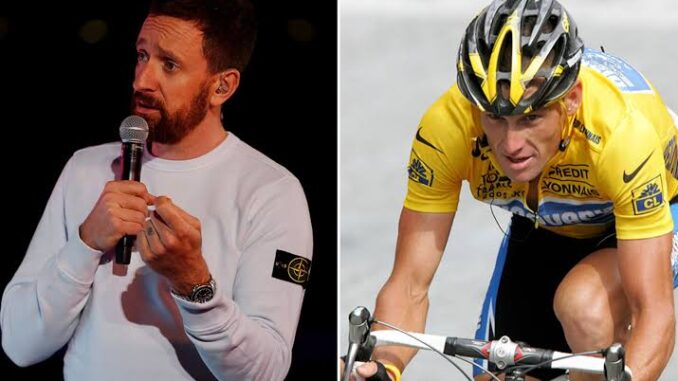
Wiggins’ Warning: Lance Armstrong’s Nemesis Opens Up About His Own Financial Fall from Grace
In the world of professional cycling, few names resonate as powerfully as Sir Bradley Wiggins. A celebrated champion, Wiggins has enjoyed the highest highs of the sport, including becoming the first British cyclist to win the Tour de France in 2012, followed by his knighthood for services to cycling. However, in recent years, the man once known as a hero of the sport has found himself navigating the treacherous waters of financial instability, a far cry from the glory days of his career.

Wiggins’ recent candid admissions about his financial struggles have sent shockwaves through the cycling community and beyond. In a sport where fame and success often come with substantial financial rewards, Wiggins’ story serves as a sobering reminder of how quickly fortunes can change, even for the most successful athletes.
The Rise to Stardom: From Humble Beginnings to Olympic and Tour de France Glory
Bradley Wiggins’ journey to the top of professional cycling was anything but easy. Born to a working-class family in Ghent, Belgium, and later raised in London, Wiggins faced numerous challenges on his path to becoming a world-class cyclist. His early years were marked by dedication and sacrifice, as he juggled school with the grueling demands of training and competition.
Wiggins first made a name for himself on the track, winning his first Olympic medal at the 2000 Sydney Games in the team pursuit. His success on the track continued over the next decade, with Wiggins amassing a total of eight Olympic medals, including five golds. However, it was his transition to road cycling that truly elevated him to global stardom.
In 2012, Wiggins became the first British cyclist to win the Tour de France, a historic achievement that cemented his place in the pantheon of cycling greats. That same year, he won a gold medal in the time trial at the London Olympics, further solidifying his status as a national hero. Wiggins’ achievements on the road and track earned him numerous accolades, including the prestigious BBC Sports Personality of the Year award and a knighthood in 2013.
The Fall from Grace: Financial Woes and the End of a Glittering Career
Despite his incredible success, Wiggins’ career was not without its challenges. The latter part of his career was marred by controversies, including questions about his use of therapeutic use exemptions (TUEs) for medication that some claimed gave him an unfair advantage. These allegations, coupled with the intense pressure of maintaining his place at the top of the sport, took a toll on Wiggins’ mental and emotional well-being.
In 2016, Wiggins retired from professional cycling, leaving behind a legacy that few could match. However, the transition from the spotlight to a life away from the bike proved difficult for Wiggins. In the years following his retirement, Wiggins faced a series of personal and financial challenges that have only recently come to light.
In a candid interview, Wiggins revealed that he had struggled with financial instability in the years since his retirement. Despite the millions he earned during his career, Wiggins admitted that he had made poor financial decisions that left him in a precarious position. “I never really thought about the future,” Wiggins confessed. “I was so focused on winning and achieving my goals that I didn’t think about what would happen when it was all over.”
Wiggins’ financial woes were compounded by the pressures of maintaining his public image and the demands of his personal life. As a high-profile athlete, Wiggins was expected to maintain a certain lifestyle, which often meant spending beyond his means. “There was this expectation that I had to live a certain way, drive certain cars, live in certain houses,” Wiggins explained. “I got caught up in it all, and before I knew it, I was in over my head.”
The situation reached a breaking point when Wiggins found himself unable to pay his bills and struggling to support his family. The man who once stood atop the podium at the Tour de France was now facing the harsh realities of financial ruin. “It was a wake-up call,” Wiggins said. “I had to take a hard look at my life and make some difficult decisions.”
The Lessons Learned: Wiggins’ Message to Young Athletes
Wiggins’ story is a stark reminder of the challenges that many athletes face when transitioning from their sports careers to life after retirement. For years, Wiggins was at the top of his game, but like many athletes, he found himself unprepared for the financial realities of life after sports.
Wiggins has since become an advocate for financial literacy and planning among athletes, using his own experiences as a cautionary tale. “I don’t want anyone else to go through what I went through,” Wiggins said. “Young athletes need to understand the importance of planning for the future, not just in terms of their careers, but in terms of their finances as well.”
Wiggins now spends much of his time speaking to young athletes and encouraging them to take control of their finances early in their careers. He emphasizes the importance of working with financial advisors and making smart investments to secure their futures. “It’s not about how much money you make; it’s about how much you keep and how you manage it,” Wiggins explained. “You have to be smart and think long-term.”
In addition to his advocacy work, Wiggins has also made efforts to rebuild his own financial stability. He has taken on various roles within the cycling community, including working as a commentator and pundit for major cycling events. Wiggins has also written several books and launched his own podcast, where he discusses his career and the challenges he has faced.
The Broader Implications: Financial Struggles in the World of Professional Sports
Wiggins’ financial struggles are not unique. Many athletes, across various sports, have found themselves in similar situations after retirement. The pressures of maintaining a certain lifestyle, coupled with the challenges of transitioning to a new career, can lead to financial instability for even the most successful athletes.
Studies have shown that a significant percentage of professional athletes face financial difficulties within a few years of retirement. This issue is particularly prevalent in sports like cycling, where athletes often have shorter careers and lower earning potential compared to sports like football or basketball. The lack of financial education and planning resources for athletes only exacerbates the problem.
Wiggins’ story highlights the need for greater support and resources for athletes, both during and after their careers. Organizations like the Professional Cyclists’ Association (PCA) and other sports unions have recognized this issue and are working to provide financial education and planning resources to their members. However, there is still much work to be done to ensure that athletes are adequately prepared for life after sports.
As Wiggins continues to rebuild his life and career, he remains committed to sharing his story and helping others avoid the pitfalls he encountered. His message to young athletes is clear: success in sports is not just about winning medals and earning money; it’s about planning for the future and making smart decisions that will ensure long-term stability.
“I want to be a voice of reason for the next generation,” Wiggins said. “I’ve made my mistakes, and I’ve learned from them. If I can help just one person avoid the same mistakes, then it’s all been worth it.”
Wiggins’ warning is a powerful reminder that even the most successful athletes are not immune to the challenges of life after sports. His story serves as both a cautionary tale and an inspiration for others to take control of their finances and plan for a secure future.
As the cycling world continues to evolve, Wiggins’ legacy will not only be remembered for his achievements on the bike but also for his efforts to educate and empower the next generation of athletes. In a world where the pursuit of victory often overshadows everything else, Wiggins’ message is a crucial reminder that true success is about more than just winning—it’s about building a life that can sustain the highs and withstand the lows.
Leave a Reply